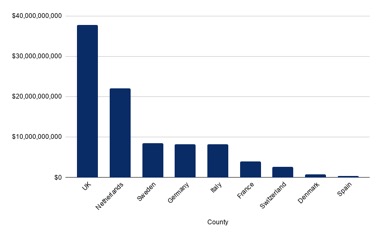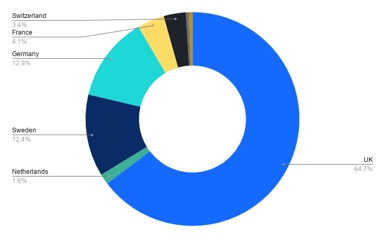
FinovateFall: Digital AND Global
What’s to like about FinovateFall Digital, our all-digital fintech conference starting Monday, September 14th and continuing through Friday, the 18th? A CEO from one of our demoing companies pointed out that one of the special things about this fall’s conference is that because the FinovateFall is all-digital, it enables people all over the world to participate as virtual attendees.
With this in mind, we wanted to use this week’s Finovate Global to highlight those companies from outside the United States that will be demonstrating their latest fintech innovations as part of our annual autumn event. Here’s hoping they bring a few friends from across the border – or from over the sea – to digitally join us!
Cinchy – Toronto, Ontario, Canada. Provides a real-time data collaboration platform to solve data integration, access, governance, and solution-delivery challenges. Finovate Best of Show Winner. Founded in 2014.
DQ Labs – Bangalore, Karnataka, India. Offers a unified suite of modules that enables companies to unlock the value in their data to gain new insights. Founded in 2019.
Horizn – Toronto, Ontario, Canada. Helps banks and financial institutions dramatically increase digital adoption. Finovate Best of Show winner. Founded in 2012.
Mostly AI – Vienna, Wien, Austria. Enables companies to unlock privacy-sensitive data assets while protecting privacy. Founded in 2017.
Payever – Hamburg, Germany. Offers a Commerce Operating System to help entrepreneurs start, run, and grow their businesses. Founded in 2013.
Scientia Consulting – London, U.K. Leading fintech consulting and development firm in Europe. Founded in 2010.
Join us next week for Finovate’s latest all-digital fintech conference. Visit our registration page today and save your spot at our live and On Demand event.
Digital Currency Comeback?
Back in January Finovate Global took a look at the growing case for national digital currencies. We highlighted initiatives in countries as different as India and Japan, and underscored observations from Christine Lagarde (former head of the IMF and current president of the European Central Bank) in her address, “The Case for New Digital Currency”.
Now Ms. Lagarde is back in the news hinting at a near-term resolution to the question of a digital euro. In a speech this week at the Bundesbank’s conference on digital banking and payments, Lagarde argued that Europe must be wary of falling behind when it comes to the development of digital payment options, and that consideration of a national digital currency needs to be a part of that conversation.
“The Eurosystem has so far not made a decision on whether to introduce a digital euro,” Lagarde said. “But, like many other central banks around the world, we are exploring the benefits, risks, and operation challenges of doing so.” Lagarde added a taskforce on development of a digital euro is expected to release its findings “in the coming weeks.”
Open Banking All Over the World
We recently investigated the prospects for open banking in Australia. This week we share an overview of the state of open banking in Switzerland courtesy of Fintech Zoom’s Jung Min-Seo.
“Europe may moderately declare to be the cradle of open banking,” Min-Seo wrote, “however in contrast to within the E.U. the place members are obliged to implement PSD2, a directive meant to opening up cost transactions to non-banks and promote competitors, Switzerland has no such regulation in place.”
Read the rest: A Brief 2020 Overview of Open Banking in Switzerland
Here is our look at fintech around the world.
Middle East and Northern Africa
- The Fintech Times profiles Demet ZĂĽbeyiroÄźlu, chair of the Financial Innovation and Technologies Association, a nonprofit based in Turkey
- Israeli fintech startup Salaryo secures $5.8 million in funding from investors including Dubai-based private equity fund Ken Investments.
- Jordanian fintech Whyise raises $675,000.
Central and Southern Asia
- Trulioo expands to Pakistan.
- TechWire Asia looks at how Amazon is leveraging its relationship with India to grow its fintech offerings.
- Proving that cash is still alive in India, RapiPay, a subsidiary of Capital India Finance, will install 500,000 micro ATMs in the country over the next two years.
Latin America and the Caribbean
- Caribbean-based fintech WiPay teams up with Mastercard to expand digital payments in the region.
- Austria’s Paysafecard announces expansion into Mexico.
- Mexican fintech Ubank, which offers an automated savings solution, plans to expand to the United States.
Asia-Pacific
- Revolut goes live in Japan.
- Onfido brings ID verification to migrant worker e-marketplace, MyCash Money, which serves workers in Malaysia and Singapore.
- Backbase partners with Vietnam’s Tien Phong Commercial Joint Stock Bank (TPBank) to speed the institution’s digital transformation.
Sub-Saharan Africa
- Nigerian fintechs Opay and PalmPay, along with South African e-payment firm, Yoco, are the only three Africa fintechs to earn spots on CB Insights’ 2020 Fintech Top 250.
- Ozow, a digital payments company based in South Africa, launches its new payments platform.
- Nigeria’s Sparkle announces plans for digital distribution of insurance solutions.
Central and Eastern Europe
- Blockchain analytics firm Chainalysis praises Ukraine as the country with the greatest rate of cryptocurrency adoption in a new report.
- Hungarian biometric payment startup PeasyPay announces plans to expand to Spain and the U.K.
- Balkan Insight reviews the fintech ecosystem in Croatia.
Photo by Candid Shots from Pexels


































